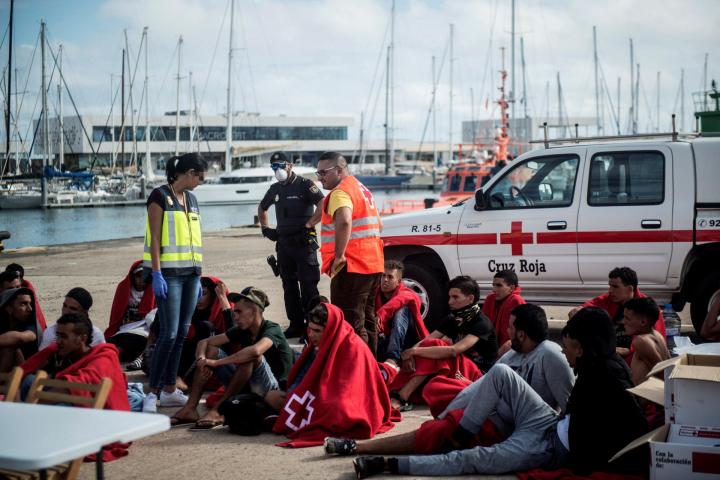ISS Today
AU summit 32: Maghreb’s changing politics of migration

Political challenges and deep inequalities fuel the sharp rise in irregular migration from North Africa. By Matt Herbert for ISS TODAY.
First published by ISS Today
Irregular migration by people from the Maghreb is rising. Countries of the region that were previously transit spaces have become zones of departure for tens of thousands of young Moroccans, Algerians, Tunisians and Libyans. This is changing the politics around irregular migration in the region.
In 2018, European states, those in the western Balkans, Tunisia and Algeria intercepted 38 968 Maghrebi irregular migrants, up from 15 961 in 2016. Maghrebis now comprise a far larger total of irregular migrant arrivals in Europe than in past years, growing from 3% in 2016 to nearly 20% in 2018. Most are young men, but an increasing number of minors, females and families with small children are undertaking the journey north.
The routes taken by Maghrebi migrants are also shifting. Earlier in the decade, most Maghrebi migrants departed for Europe via third countries, with Moroccans for example going through Libya and Algerians via Turkey. In part this reflected the dominant migration route of the given year, however, it was also linked to securitised approaches to migration adopted by states in the Maghreb and the difficulty of leaving from home.
Over the past two years this has changed, with most Maghrebi irregular migrants now leaving directly for Europe from their home countries. Tunisians now comprise the main nationality intercepted by Italy, while Moroccans top the list of apprehensions by Spain.
Some of this change is due to changing circumstances in countries previously favoured for departure, such as rising violence in Libya and more strident control of irregular migration by Turkey. However, the rise also suggests that domestic factors in the Maghreb are impacting either the will or capacity of governments to stem departures by their citizenry.
Ultimately the growing number of Maghrebi irregular migrants, and their use of routes directly from their home countries to Europe are changing the politics around the issue in the region.
Discussions on cross-Mediterranean irregular migration fixate on how European responses are driven by their own domestic political considerations. Observers often fail to acknowledge that the matter is also deeply political in the Maghreb, where the factors driving irregular migration are also the defining political challenges of the day.
The first, and most important, of these, is the worsening economy in the Maghreb. Unemployment is high, especially for youth, and inflation has risen rapidly, notably in Tunisia. Even in Morocco, which has enjoyed an economic boom in recent years, economic gains are unequally distributed, with many youths and those in rural areas seeing few tangible benefits or opportunities.
The second factor driving irregular migration is the entrenched structural inequality across the Maghreb. The livelihood options individuals have, the degree of government services they can access, and their treatment by security forces can vary significantly based on one’s family, region of origin, economic status and age.
A growing number of young Maghrebis have looked to irregular migration as a way to achieve equality in life and economic opportunity outside the region. This is fuelled by pessimism that economic trends will be reversed soon and frustration at the lack of will or progress in addressing structural inequality.
However, these drivers have also spurred numerous protests and manifestations of social unrest across the region – incidents that are perceived to be far more politically threatening by the authorities.
In an era of austerity, the region’s governments have been hard-pressed to effectively alter these drivers. Irregular migration, however, changes the political equation. While it doesn’t address the larger structural issues, it does lessen social tensions by offering restless youth a pathway to a perceived opportunity. This may prompt a different, more tolerant approach by the authorities towards migration by their citizens versus the transit migration of foreigners.
It also affects the politics of migration between Maghrebi states and those in Europe. As long as the region was predominately a transit zone for migrants from elsewhere, deals on migration with Europe offered significant diplomatic, economic and security benefits for Morocco, Algeria, Tunisia and Libya while posing little domestic political cost.
A rise in irregular migration from their home countries changes this calculus, making both the acceptance of returned migrants and security partnerships with Europe a far more politically contentious endeavour. Few governments wish to be seen as Europe’s migration gatekeepers, acceding to European pressure to the detriment of their constituents.
This is deeply frustrating for European states. However, it should not be a surprise. Just as European domestic priorities colour their approach towards irregular migration, domestic priorities also dictate action by Maghrebi states. Facing a deteriorating regional economic situation and rising social unrest, these North African states are focused on ensuring their own internal stability, not on Europe’s irregular migration concerns.
The sharp rise in Maghrebi irregular migration to Europe is likely to continue in 2019, further straining the politics around migration within North Africa and between countries in the region and those in Europe. In light of this, European states should alter their approach.
Those working on irregular migration in the Maghreb need to understand the changing politics of the phenomenon, its deep-seated drivers, and the underlying concerns and priorities of states in the region. Without this, both bi-lateral frustration and Maghrebi irregular migration will continue to rise. DM
This is the first in a series of articles focusing on the African Union summit which starts this week. The 2019 AU theme focuses on finding solutions to forced displacement in Africa.
Matt Herbert is a Senior Research Consultant on migration, ISS and Partner at Société Maharbal

















 Become an Insider
Become an Insider